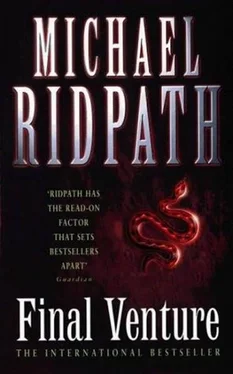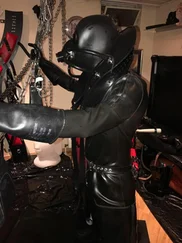I wasn't sure whether I would be able to keep what I had discovered entirely quiet. But I resolved to do my best to keep the photographs from Lisa for as long as I could.
Tetracom were making their presentation at three o'clock that afternoon. I had to be there. I arrived at the office at one o'clock, hoping for a quiet spell over lunch when I could talk to John. But he was out at National Quilt in Lowell.
Bob Hecht and the Tetracom management were slick. They had been to business school, they had made countless big-company presentations, and it showed. It was an interesting contrast with Craig's raw enthusiasm and absolute determination. I wasn't sure which approach I preferred – probably Craig's since it personalized the struggle. But Tetracom's method was tailor-made for a venture capitalist's investment committee. Even the bust of Paul Revere seemed to be listening in respectful silence.
Everyone was there apart from John: Gil, Art, Diane, Ravi, Daniel and me. Of course Daniel and I didn't get to vote. Art had arrived late back from lunch, a glassy look in his eyes.
When Bob Hecht finished, Diane thanked him and asked for questions. I checked Art, but he seemed absorbed in the bottom right hand corner of his yellow pad. Gil asked an obscure question about consolidation among Tetracom's customers leading to stronger purchasing power on their part and lower margins for suppliers. Hecht had a good business school answer; with a small smile I imagined what Craig's response would have been – 'Huh?' Ravi asked about threats from Far Eastern manufacturers. Daniel asked about the risk that the stock market might become fed up with communications stocks by the time Tetracom wanted to float. All good questions, all answered well. Diane looked pleased.
Daniel was just beginning to ask a follow-up question when he was interrupted by a low growl. We all looked towards Art, who was drawing ever thicker lines along the bottom of his pad, as though he were crossing something out.
Diane raised her eyebrows to encourage Daniel to continue speaking. Then Bob Hecht blew it. He smiled towards Art. 'Yes, sir?'
He probably thought he was being smart, bringing in all the decision-makers, getting their objections out into the open. He wasn't.
'Huh?' said Art, looking up as though he had just been woken. His eyes, which had been dull before, now glinted dangerously out of his red face.
'Do you have a question, sir?'
Art cleared his throat. 'Yes, I have a question.'
'And what's that?' Hecht's eagerness was wearing thin. Diane looked on in something like panic.
'Why does a chicken-shit company like yours have the gall to ask us for money?'
Art!' snapped Gil.
'It's a fair question,' said Art. 'Answer it.'
'We believe that we have a unique…'
'Don't worry, Mr Hecht,' interrupted Gil. 'Art, I'd appreciate it if you asked a more specific question.'
Art looked at Gil. Looked at Hecht again. Smiled. 'OK,' he said. 'How many venture-capital investors have you been to see?'
'You're the first ones,' replied Hecht immediately. 'We wanted to go to the best first.' Diane smiled appreciatively.
'The first since when?' asked Art.
'What do you mean?'
'Isn't it true you went to a bunch of venture capitalists last year and they all turned you down?'
For less than a moment Hecht was struck by panic. It was no more than a brief flutter on his handsome, sincere features. But we all saw it. Diane's gaze switched sharply from Art to Hecht. Gil's crumpled face crumpled some more. Art smiled.
Hecht, composed again, answered the question. 'It's true that last year, before we had a business model that was up and running, we did have a couple of informal discussions with some VCs. Just to help with our planning, you understand.'
'How many?' Art demanded.
Hecht glanced at Diane for help. She didn't give it.
'About a half-dozen.'
'I said, how many?' Art repeated.
'Let me think,' said Hecht. 'Eight.'
'Eight, eh? And who were they?'
Hecht rattled off eight of the biggest names in venture capital, most of them West Coast firms. Diane's face reddened. She should have asked these questions. And so should I.
'I see,' Art said. We waited for the follow-up question. Art seemed to sway slightly in his chair. The silence was becoming uncomfortable. Eventually it came. And why didn't you go back to these firms when you had your model up and running, Mr Hecht? Was it because you knew they wouldn't give you money in a thousand years?'
'No!' protested Hecht. He surveyed the group of venture capitalists. He knew he was in danger of losing us. He sighed. 'There was another member of the team, then. He was a kind of non-executive chairman and he was willing to provide the seed money. I subsequently found out that he was the one the VCs didn't like.'
'Oh really? And what was his name?'
'Murray Redfearn.'
Art and Gil exchanged glances. So did Diane and I. It was clear that they had heard of him and we hadn't.
'Murray Redfearn was involved in a couple of spectacular disasters in the late eighties,' explained Gil. 'A lot of venture capitalists lost money on him. Our first fund even had a small piece of one of his deals.'
Hecht nodded. 'We only found all this out later. So we bought him out, developed the product further, and here we are.'
'You lied to us,' Art said.
'No, I didn't,' protested Hecht. 'I've just told you the truth.'
'But you lied to Ms Zarrilli.'
Hecht looked shaken. 'Diane?' He glanced towards her for help.
Diane paused. She had recovered her composure now. She had a fine line to tread. She didn't want to seem weak to Hecht or the investment committee, but she also didn't want to kill the deal. 'I didn't ask the question, Art,' she said, 'and I should have. But I must admit, Bob, it would have been nice if you had been more open with me on this.'
'Damn right,' said Art. 'Now why don't we tell these jerks to piss off and let us get back to work.'
Hecht reddened. One of his colleagues, the Chief Financial Officer, looked as though he was about to explode.
'Art!' snapped Gil. 'That's enough. Thank you, Mr Hecht,' he said, with a smile. 'That was a most interesting presentation. Diane will be in touch with you very shortly.'
There was an awkward silence as the Tetracom team picked up their presentation materials and filed out of the board room, followed by Diane. She led them to a conference room, where we had agreed they would wait for the committee's decision. Diane returned in a moment.
Gil was red-faced, glowering at Art. He set great store by the image of the firm, and behaviour like Art's was not what he wanted. He no doubt suspected Art was drunk. And he now knew his drinking could do serious damage to the firm.
'Could you leave us while we discuss this deal, Art?' His voice was icy.
'No way,' said Art. 'I have strong views about this deal.'
'I gathered that.'
'If I hadn't asked the questions, you'd never have found out the answers,' pointed out Art. 'And I'm a partner in this firm. I have a responsibility to investors. I have a right to be part of its investment decisions.'
Art was suddenly sounding coherent.
'All right,' said Gil. 'You can stay. What do you want to do, Diane?'
'First I should apologize,' she began. 'I should have asked the questions Art did. Thank you.' She smiled charmingly at him. He grunted. 'I still believe in the deal, though. So I'd like to ask for investment approval subject to checking out Bob Hecht's story.'
'He could be hiding anything,' said Art.
'I think he's probably telling the truth. But it'll be easy to check with the other venture capitalists. Which is what I'd like to do.'
'I can help you with that,' said Gil. 'I'd like to hear the answers myself.'
Читать дальше












